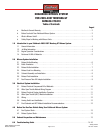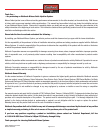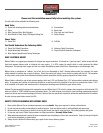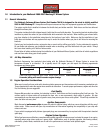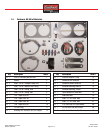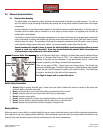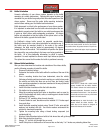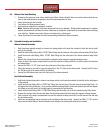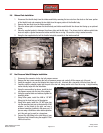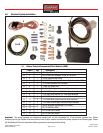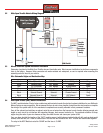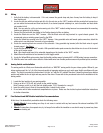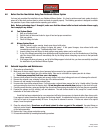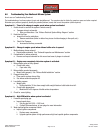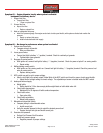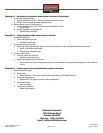
©2007 Edelbrock Corporation
Brochure #63-0478
Catalog #70410
Rev. 7/07 - DC/mc
Page 3 of 16
Caution!!
Please read this installation manual fully before installing this system.
You will need to have available the following tools:
Hand Tools:
❑ Socket set including ratchets and extensions ❑ Screwdrivers
❑ Pliers ❑ Bench Vise
❑ Wire Crimping Pliers, Wire Strippers ❑ Floor Jack and Jack Stands
❑ Razor Blade or Other Sharp, Flat Edged Cutting Tool ❑ Safety Glasses
Power Tools:
❑ Power Drill ❑ Drill Bits
You Should Understand the Following Skills:
❑ Power Tool Safety Procedures ❑ Undercar Safety Procedures
❑ Proper Measuring Techniques ❑ Proper Electrical Assembly Techniques
❑ Basic Engine Operation and Tuning Techniques
WHAT IS NITROUS OXIDE?
Nitrous Oxide is a cryogenic gas composed of nitrogen and oxygen molecules. It is stored as a “gas over liquid”, which means that both
liquid and gaseous nitrous oxide is delivered into your engine. It is 36% oxygen by weight, which is what produces the added
horsepower. By injecting more oxygen and fuel, we create the additional power much like a supercharger or a turbocharger does.
Nitrous Oxide is considered an “oxidizer”, not a fuel, and is non-flammable by itself. Because nitrous oxide is a cryogenic, the same
safety methods in handling dry ice apply to nitrous. Direct skin contact will cause a burn similar to contact with dry ice. The exception
in using nitrous oxide comes from increased breathing hazards associated with the gaseous properties of nitrous oxide.
Nitrous Oxide is offered for sale in two common grades, which are U.S.P. and
Nytrous Plus
. U.S.P. nitrous oxide is medical grade nitrous
oxide. Its common use is dental and veterinary anesthesia as well as used as a propellant in food such as canned whip cream. U.S.P.
is not available to the public and would provide no horsepower advantage over automotive grade nitrous oxide.
Nytrous Plus
was specifically designed for automotive use and differs from U.S.P. in that it contains trace amounts of sulfur dioxide (100
parts per million or “PPM”) added to prevent substance abuse. The sulfur dioxide is an irritant to your breathing passageways and will
cause sore throats and sore nasal passages if inhaled.
Nytrous Plus
was specifically created for automotive applications and is available
for sale at many speed shops across the USA.
SAFETY STEPS FOR WORKING WITH NITROUS OXIDE
1. Never inhale
Nytrous Plus
as continued exposure can cause death. Keep your exposure to nitrous oxide minimal.
2. Do not vent nitrous oxide to atmosphere in confined spaces. Only vent nitrous oxide in well-ventilated and open areas.
3. Nitrous oxide can cause burns so protect all skin in and around your hands, arms and face. Wear safety glasses and gloves.
4. Do not use any form of Teflon Tape as sealant on fitting connections. Use only Teflon Paste.
5. When washing components, ensure the clean components are completely dry, free of oils, and solvents. Failure to remove all liquids
could cause component or system failure.
6. Always turn the bottle off before making any repairs to the nitrous delivery system.



